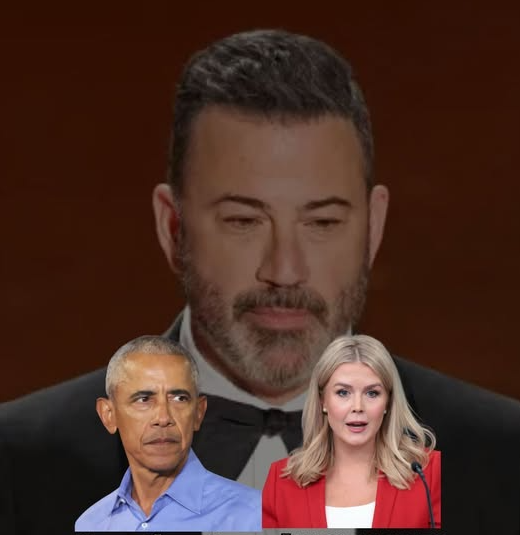White House Press Secretary Karoline Leavitt appeared on Kayleigh McEnany’s new Fox News program, Saturday in America, to address the ongoing controversy surrounding former President Barack Obama’s recent comments on the indefinite suspension of Jimmy Kimmel Live.
Obama, speaking out on X (formerly Twitter) last Thursday, criticized what he described as an alarming expansion of cancel culture under the current administration. “After years of complaining about cancel culture, the current administration has taken it to a new and dangerous level by routinely threatening regulatory action against media companies unless they muzzle or fire reporters and commentators it doesn’t like,” Obama wrote.
He continued, emphasizing his concern for press freedom: “This is precisely the kind of government coercion that the First Amendment was designed to prevent — and media companies need to start standing up rather than capitulating to it.”
Leavitt, however, strongly disagreed with Obama’s characterization. Speaking with McEnany, she dismissed the former president’s remarks as misinformed and out of touch. “With all due respect to former President Obama, he has no idea what he’s talking about,” Leavitt said firmly.
She explained that the decision to suspend Jimmy Kimmel’s show was entirely an internal decision made by ABC executives. “The decision to fire Jimmy Kimmel and to cancel his show came from executives at ABC,” Leavitt stressed. “It was not influenced by the White House, and President Trump did not pressure the network in any way to take this action.”
Leavitt recounted her firsthand experience at the time the news broke during the president’s visit to the United Kingdom. “And how do I know that, Kayleigh?” she asked. “Because I was with the President when this news broke in the U.K. He had no idea this was happening at the time. I was the one who informed him.”
According to Leavitt, the suspension stemmed from a serious lapse in judgment by Kimmel himself. “It was a decision that was made by ABC because Jimmy Kimmel chose to knowingly mislead his audience about the death of a highly respected man during a period of national mourning,” she explained. “He made that choice, and now he is facing the consequences for that decision and for that falsehood.”
Disney, which owns ABC, confirmed to Fox News Digital on Wednesday that Jimmy Kimmel Live, produced in Los Angeles, has been suspended “indefinitely.”
The ripple effect of this decision was swift. Nexstar Media Group, which owns hundreds of stations across the country, announced that it would preempt the program on its ABC affiliates “for the foreseeable future,” citing concerns over Kimmel’s remarks regarding Charlie Kirk’s alleged assassin.
Similarly, Sinclair Broadcast Group stated that it would remove the show from its lineup, demonstrating that the suspension was being implemented widely across multiple networks.
Leavitt’s statements highlighted a clear distinction between corporate accountability and alleged government overreach, aiming to counter Obama’s claims. She emphasized that networks have the right — and responsibility — to hold their own talent accountable for misleading content, particularly in sensitive and emotionally charged situations.
She further underscored the importance of maintaining credibility in journalism and entertainment. “When a figure with influence knowingly spreads false information, networks have a duty to respond,” Leavitt stated. “This is not about politics; it’s about integrity and responsibility.”
Observers note that the debate reflects broader tensions in American media between freedom of speech, corporate governance, and political commentary. The Kimmel suspension has sparked discussion nationwide about accountability, censorship, and the role of executives in determining content.
While Obama’s criticism framed the suspension as part of a broader pattern of suppressing dissent, Leavitt and supporters of ABC’s decision framed it as a necessary response to journalistic and ethical standards. “It’s crucial that networks stand by their values and enforce consequences when trust is broken,” Leavitt added.
The controversy has reignited discussions about cancel culture, with some arguing that holding public figures accountable is essential, while others worry it could stifle free expression. The intersection of politics, media, and entertainment continues to generate heated debates among viewers, critics, and lawmakers.
Leavitt’s appearance on McEnany’s show served to reinforce the administration’s position that no governmental coercion took place, reiterating that corporate decisions regarding talent are separate from federal influence.
She concluded by urging the public to distinguish between executive responsibility within media companies and claims of political interference. “ABC made a decision. The White House had nothing to do with it. The facts are clear,” she said.
The suspension of Jimmy Kimmel Live continues to dominate headlines, with social media platforms buzzing with reactions from fans, critics, and commentators from all sides of the political spectrum.
The case serves as a reminder of the delicate balance networks must maintain between creative freedom, public trust, and accountability, especially in an era where statements can quickly go viral and generate widespread controversy.
As the situation develops, both media companies and political figures remain under scrutiny, highlighting the ongoing tension between corporate decision-making, public perception, and governmental influence.
The indefinite suspension of Kimmel’s show raises larger questions about the responsibilities of networks, the ethics of public commentary, and the line between freedom of expression and accountability in the age of instantaneous media.
